Article of the Week
Presidential Children: The Adams Family Children
Jul 21, 2000 - © John S. Cooper
The children of John and John Quincy Adams shared several unique traits. They all showed signs of genius, but also of mental instability. The two seemed to go together, inherited traits.
John Adams, our second president, had four children. His daughter Abigail, called Nabby, died in her forties of cancer. But two of John Adams' three sons died of alcoholism, one at the young age of 30. Both had outstanding personalities and great ability, but were considered unstable. John Quincy Adams, our sixth president, suffered most of his life from melancholy and self-doubt. He wrote in his diary, after having held almost every important job in our government with great success, that he had accomplished nothing in his life.
John Quincy Adams' children shared the same personality traits displayed by their father, uncles and aunt. Of his four children, one, a daughter, died in her first year. Three sons lived to maturity. One was very successful, as were his children and grandchildren.
George Washington Adams, 1801-1829. George was born in Berlin, Prussia, which is now part of Germany. He was considered brilliant but somewhat unstable. Still, he was considered the most likely candidate to carry on the family tradition of public service to his country. George graduated from Harvard and studied law in the office of Daniel Webster. In 1826, he was elected to the Massachusetts legislature. Shortly after that, he developed a "debilitating nervous condition." He became careless in his habits, neglected his law practice and went deeply into debt. His father had to pay off his debts, which were considerable. He also got a girl pregnant. He began hallucinating and became paranoid. In 1829, he was aboard a steamer headed for New York. He became agitated and accused the other passengers of plotting against him. A short time later, he jumped or fell overboard. His body washed up on City Island in Long Island Sound six weeks later. He was marked as lost at sea, but his death was considered by most to be a suicide.
John Adams II, 1803-1834. John Adams II was born on the Fourth of July in Quincy, Massachusetts. He went to college at Harvard, but was expelled during his senior year for participating in a student riot. He then studied law under his father, and became his father's private secretary in the White House. John was very loyal to his father, and even got into a fistfight in the Capitol Rotunda with Russell Jarvis, an anti-administration reporter for the Washington Daily Telegraph. An investigating committee of the House of Representatives determined that Jarvis had attacked the younger Adams, and censured Jarvis. After his father left the White House, John ran a Washington flourmill owned by his father. After a short time, his health failed, and he became ill. He died in 1834. His death, just five years after his older brother's suspected suicide, caused his father great emotional pain. His father wrote of him, "A more honest soul, or more tender heart never breathed on the face of the earth."
Charles Francis Adams, 1807-1886. As John Quincy Adams was the only successful son of John Adams, so Charles Francis Adams was the only truly successful son of John Quincy Adams. He was born in Boston, but spent six of his first eight years in Moscow, where his father was serving as U.S. minister to Russia. In 1815, he joined his mother in her dangerous trip from Moscow to Paris through the worst of the fighting and chaos during Napoleon's downfall. He was educated in England and then at Harvard. After his graduation, he studied the law for a time, but decided upon a writing career. In addition to a number of books, he eventually edited the papers of his father and grandfather and his grandmother, Abigail Adams. He also wrote and spoke for the abolitionist cause. He served in the Massachusetts legislature from 1840-45. In 1848, he was chosen as the Vice Presidential candidate of the Free Soil Party, running with Martin Van Buren. He served in the U.S. House of Representatives from 1859-1861, when President Lincoln appointed him U.S. Minister to the Court of St. James (England), a position held by both his father and grandfather. It was in that position that he engaged in his greatest service to his country, his efforts being largely responsible for keeping Great Britain out of the Civil War. In 1871, President Grant appointed him to the international commission formed to determine damage claims stemming from England's support and aid given to the South during the Civil War. Adams won a $15 million claim for the United States. His popularity from these two achievements made him the leading candidate to challenge Grant's reelection campaign that year. Unfortunately, his outspoken support for the gentle approach to Reconstruction, which had been favored by Lincoln before his death, ruined his chances. He led on the first five ballots at the Liberal Republican Convention, but finally lost the nomination to Horace Greeley. This was his last major public activity. (See my earlier article "Charles Francis Adams: Unsung Hero" publish on 2 June 2000 for more information on his life.)
Charles Francis Adams' son (John Quincy Adams' grandson), Charles Francis Adams, Jr., (1835-1915), was a railroad executive and historian. He exposed corruption in the railroad industry and served as the Chairman of the Massachusetts Board of Railroad Commissioners from 1872-1879. He was president of the Union Pacific Railroad for six years. He wrote a number of important historical works, including a biography of his father.
Two other grandsons of John Quincy Adams also become famous historians and writers. Henry Adams (1838-1918) was a professor of history at Harvard and editor of the North American Review. He wrote biographies of Albert Gallatin and John Randolph, and a nine-volume history of the United States during the Jefferson and Madison administrations. Brooks Adams (1848-1927) wrote many works on the economy and correctly predicted that by 1950 the United States and Russia would be the two major powers in the world.
Charles Francis Adams III, son of Charles Francis Adams, Jr., and John Quincy Adams' great-grandson, continued the tradition of service to his country. He served as the Secretary of the Navy in the administration of Herbert Hoover from 1929-1933.
One other Adams descendant worth mentioning was Abigail Adams Homans (1879-1974). She was the great-granddaughter of John Quincy Adams, and the iconoclastic matriarch of the Adams family in Boston. She is remembered for a remark she made when Lady Bird Johnson visited her in 1968. While showing the First Lady through the restored homes of her presidential ancestors, Mrs. Homans, 88 years old at the time, accidentally knocked over some antique glassware. To break the strain of the silenced that ensued, she said, "Hell, I hope it isn't historic." She died six years later at the age of 94.
For five generations, the Adams family was an amazing mixture of genius, service, and tragedy. Many of the children could not handle the apparently inherited traits of depression and self-doubt. More than one died an alcoholic. But those that conquered this trait became great public servants, historians and writers. It is rare that we find a family with a record of talent, dedication, service and achievement stretching five generations. This was a truly remarkable family.
The copyright of the article PRESIDENTIAL CHILDREN: THE ADAMS FAMILY CHILDREN is owned by John S. Cooper. Permission to republish PRESIDENTIAL CHILDREN: THE ADAMS FAMILY CHILDREN in print or online must be granted by the author in writing.
White House Heroes, Part I
© John S. Cooper
Originally published: April 19, 2002
Many well-known and celebrated heroes have lived in the White House. Some have gotten to the White House on the popularity of their reputations as heroes. But not all the heroes who lived in the White House were adults at the time. A number of White House children have gone on to do great things in their own right. Two were recognized as genuine heroes when they received the Medal of Honor (also called the Congressional Medal of Honor), our nation's highest award for gallantry and courage.
Theodore Roosevelt, Jr., was born September 13, 1887 at Oyster Bay, New York. Teddy, Jr. was much like his father in both looks and mannerisms. His personality and his career were also much like his father’s. Ted, Jr. grew up in his father’s image, engaging in what his father called “the active life” and enjoying the outdoors and sports.
Teddy, Jr. graduated from Harvard. He married Eleanor Butler Alexander on June 20, 1910 in New York City, and they had four children together. He was commissioned a major in the army in 1917. (His father also volunteered, but was turned down for political reasons. President Woodrow Wilson had no love for TR, and did not want him leading a division in combat.) During World War I, Teddy, Jr. earned promotion to lieutenant colonel. He was wounded and gassed at the Battle of Soissons. He later commanded an infantry regiment at the Battle of the Argonne. He was awarded the Purple Heart, the Distinguished Service Medal, and the Distinguished Service Cross, second only to the Medal of Honor as the United States’ highest medal for valor.
After the armistice, Ted, Jr. entered politics. He was elected to the New York State Assembly in 1919, and was appointed assistant secretary of the navy in 1921 by President Warren Harding. Ted Jr. became an unwitting accomplice in the infamous Teapot Dome scandal. As assistant Secretary of the navy, he facilitated the transfer of the Teapot Dome oil reserve lands from the Navy Department to the Department of the Interior. He had no part in the illegal or unethical actions of those involved, and no blame ever attached to him.
Ted Jr. ran for governor of New York in 1924, but lost to the popular Al Smith. He was appointed governor of Puerto Rico by President Calvin Coolidge and served from 1929-1932. He was then appointed governor of the Philippines by President Hoover and served from 1932-1933. In World War II, he served as a brigadier general, and the assistant commander of the 4th Infantry Division.
Ted Jr. received the Medal of Honor for his actions on D-Day, leading his men on Utah Beach during the Normandy landings. He had twice asked to lead his men during the landings, but his request was rejected. He then put the request in writing, which made it harder to turn down, and it was approved.
Ted Jr. was the first Allied general officer to wade ashore and the only general officer in the first wave during the amphibious assault. Navigational errors caused by bad weather and strong currents, resulted in the first wave of the amphibious assault landing in the wrong inlet, a mile or two from the intended landing zone. It was, however, less heavily defended than the original objective, and Roosevelt ordered the rest of the troops and supplies to land where his men were mistakenly put ashore. He was quoted as saying, “We’ll start the war from here!” (Henry Fonda, who played Ted Jr. in the film “The Longest Day”, delivered that famous line.)
The 4th Division moved rapidly inland and overwhelmed enemy positions in their way. They linked up with the airborne forces inland sooner and with fewer casualties than any of the divisions on any of the other beaches. Roosevelt led a series of assaults at different parts of Utah Beach, carrying only a pistol and walking with a cane due to his arthritis. General Omar Bradley, commander of the U.S. 1st Army and overall commander of the Normandy landings, called Roosevelt’s actions on Utah Beach the single bravest act he witnessed during the entire war. Roosevelt’s youngest son also landed in the first wave, but on Omaha Beach. This son was named Quentin II after Ted Jr’s younger brother who was a pilot shot down during World War I. This made Ted Jr. and Quentin II the only father and son to land on the Normandy beaches that day.
Theodore Roosevelt, Jr.’s Medal of Honor Citation reads:
Rank and organization: brigadier general, U.S. Army. Place and date: Normandy invasion, 6 June 1944. Entered service at: Oyster Bay, N.Y. Birth: Oyster Bay, N.Y. G.O. No.: 77, 28 September 1944. Citation: for gallantry and intrepidity at the risk of his life above and beyond the call of duty on 6 June 1944, in France. After 2 verbal requests to accompany the leading assault elements in the Normandy invasion had been denied, Brig. Gen. Roosevelt's written request for this mission was approved and he landed with the first wave of the forces assaulting the enemy-held beaches. He repeatedly led groups from the beach, over the seawall and established them inland. His valor, courage, and presence in the very front of the attack and his complete unconcern at being under heavy fire inspired the troops to heights of enthusiasm and self-sacrifice. Although the enemy had the beach under constant direct fire, Brig. Gen. Roosevelt moved from one locality to another, rallying men around him, directed and personally led them against the enemy. Under his seasoned, precise, calm, and unfaltering leadership, assault troops reduced beach strong points and rapidly moved inland with minimum casualties. He thus contributed substantially to the successful establishment of the beachhead in France .
Theodore Roosevelt, Jr. died of a sudden heart attack on the Normandy battlefield on July 12, 1944, just five weeks after the D-Day action for which he was awarded the Medal of Honor. He died just before word arrived that he had been promoted to Major General and assigned to the command of a division of his own. President Franklin Roosevelt, a cousin of his, presented the Medal of Honor to Ted, Jr’s widow with the words, “His father would have been the proudest.”
Some of Teddy Roosevelt, Jr's awards, in order:
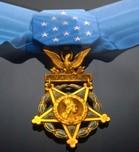
1. Medal of Honor (aka Congressional Medal of Honor)

2. Distinguished Service Cross

3. Distinguished Service Medal

4. Purple Heart

Young Teddy, Jr enjoyed the outdoors, and like his father, hunted
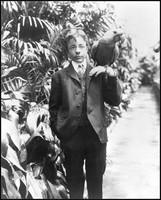
Teddy, Jr with his macaw, Eli
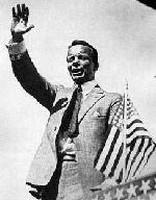
Teddy, Jr while serving as governor of Puerto Rico

Brigadier General Roosevelt named his personal jeep after his father's famous unit
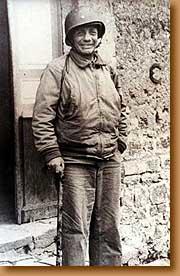
Brigadier General Theodore Roosevelt, Jr.
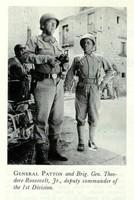
Brigadier General Roosevelt with Lt. General George Patton
The copyright of the article WHITE HOUSE HEROES, PART I is owned by John S. Cooper. Permission to republish WHITE HOUSE HEROES, PART I in print or online must be granted by the author in writing.
MS/HS Social Studies / Alumni Director
- Teacher Home
- Article of the Week
-
Published Articles
- White House Heroes, Part I
- Presidential Children: The Adams Family Children
- Presidential Children: Teddy's "White House Gang"
- A Dead End Job: Madison's Vice President
- Rum, Romanism, and Rebellion: The Election of 1884
- Substitute First Lady: Harriet Lane
- Robert Todd Lincoln: Reluctant Witness to History
- Dolley Madison: An American Original
- The Wit and Wisdom of Abraham Lincoln, Part I
- Almost President: Benjamin Wade
- Death in the White House
- A Tale of Two Tickets, Part I
- A Tale of Two Tickets, Part II
- Acting Vice President, Part I
- Acting Vice President, Part II
- The Case for the Electoral College
- Chat Room
- Links
- Photo Albums
- Trivia Questions
- U.S. History 8
- Presidential History Honors
- Middle School Geography
This site provides information using PDF, visit this link to download the Adobe Acrobat Reader DC software.
